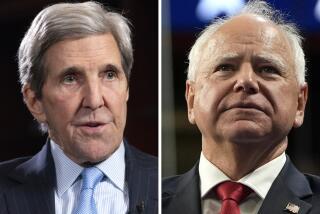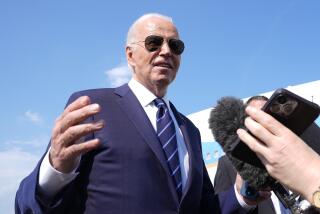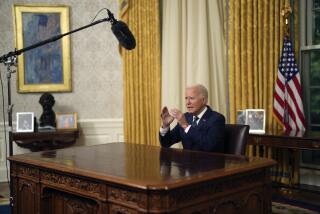Kerry calls apparent chemical attack in Syria a ‘moral obscenity’
WASHINGTON — Moving closer to possible U.S. military action, Secretary of State John F. Kerry condemned last week’s apparent poison gas attack in Syria as a “moral obscenity” and declared that President Obama believed those responsible must be held accountable.
Kerry, saying he was horrified by the images of the victims, made a case for a forceful response against President Bashar Assad’s government. He said evidence of a chemical attack that caused “the indiscriminate slaughter of civilians” in the suburbs of Damascus early on Aug. 21 was undeniable.
“Make no mistake: President Obama believes there must be accountability for those who would use the world’s most heinous weapons against the world’s most vulnerable people,” Kerry said at the State Department. “Nothing today is more serious, and nothing is receiving more serious scrutiny.”
Kerry did not mention military reprisals, but the accusatory language and grim tone suggest Obama is nearing a decision that he has long sought to avoid: whether to order cruise missile strikes or other limited military action in another Middle East nation. Aides said the White House planned to release an intelligence estimate about the chemical attack.
U.S. officials and foreign diplomats say they are privately discussing the use of warships, submarines and aircraft outside Syrian airspace to launch punitive attacks on Syrian military targets, including command-and-control facilities and Republican Guard units, especially if those units are determined to have carried out the attacks.
The barrage could begin in days, officials said, and probably would last only a few days. The attacks would not target Assad or seek to overturn his government or end the civil war that has raged since early 2011. Those carrying out the attacks also would try to avoid hitting chemical weapons depots for fear of releasing toxins and causing more victims, or opening the sites to looters.
A United Nations chemical weapons team began gathering evidence in Damascus on Monday after initially being forced back by sniper fire. But the fact-gathering process could take weeks, officials said, and Kerry preemptively dismissed their visit as “too late to be credible.”
With polls showing only 1 in 5 Americans favors direct intervention in Syria, Kerry’s emotional language also suggests an attempt to build public support for a muscular response. “No matter what you believe about Syria,” he said, America must respond “so it never happens again.”
He also dismissed Syria’s claims that insurgents fired poison gas to draw the West into the war on their side. “Anyone who could claim that an attack of this staggering scale could be contrived or fabricated needs to check their conscience and their own moral compass,” he said.
White House officials have ruled out sending troops to Syria, or sending warplanes to enforce a no-fly zone to keep Syrian aircraft grounded.
Kerry said Obama was consulting U.S. allies and members of Congress before he determines his response. House Speaker John A. Boehner (R-Ohio) told the White House in a call Monday that Obama must set “clearly defined objectives” before ordering military action in Syria, according to Boehner’s spokesman, Brendan Buck.
Gen. Martin Dempsey, chairman of the Joint Chiefs of Staff, and Gen. Lloyd J. Austin III, the commander of U.S. Central Command, who would lead an attack on Syria, were in Jordan on Monday for talks focusing on Syria with defense chiefs from around the region, according to Pentagon officials. They said the meeting was not scheduled in response to last week’s attack.
Key European and Middle Eastern nations indicated backing for limited military action, even without a clear U.N. mandate authorizing force.
In London, British Foreign Secretary William Hague told the BBC that world powers couldn’t afford to wait for action from a U.N. Security Council that has “not shouldered its responsibilities on Syria.”
French President Francois Hollande predicted that the West’s response “will be decided this week.” He said the West would leave “a little time for the diplomatic process, but not too much time.”
German Foreign Minister Guido Westerwelle said that if chemical weapons use was confirmed, “Germany would be among those who consider it right that there be consequences.”
Turkey, Saudi Arabia and other nations in the region have also indicated that they could support a military response.
Obama warned in August 2012 that use of chemical weapons would cross a “red line” and trigger a U.S. response. Advocates for airstrikes say the incident last week has put Obama’s credibility on the line. They say he must punish Assad’s forces and reduce Syria’s ability to carry out gas attacks.
Obama “remains reluctant to get embroiled in the conflict,” but “you could see a series of strikes on Syrian military and some regime targets to send the message that when we say things we mean them,” said Colin Kahl, a Georgetown University professor who served as a senior Pentagon official for the Middle East during Obama’s first term.
At the White House, spokesman Jay Carney said the president’s views hardened over the weekend. Obama met for several hours Saturday with his national security team, and the evidence they presented “reinforced the factual foundation” that poison gas was used, Carney said.
Carney described the incident as a breach of international law but would not discuss whether the administration had legal authority to launch a retaliatory attack. “I’m not going to lay out a legal case here, because we are evaluating potential responses.”
Any attack targeting Syrian military units and installations would involve some of the Syrian government’s most loyal and well-trained troops, including Republican Guard units. Syria’s chemical arms are believed to be under their control, and the attacks Wednesday appeared to be a well-coordinated operation, some experts said.
Four U.S. guided missile destroyers are in the eastern Mediterranean, each armed with cruise missiles capable of striking Syria, a senior Pentagon official said. The Pentagon also maintains fighters and bombers at air bases in the Persian Gulf that could be used in an attack.
The Pentagon has not revealed whether it is moving additional warplanes and submarines to the area, though Defense Secretary Chuck Hagel said over the weekend that options under consideration required “positioning our forces.”
More than 1,000 U.S. troops have been in Jordan since earlier this year. The force includes a contingent of F-16 fighter jets and Patriot antimissile batteries meant to keep the civil war from spreading beyond Syria’s borders. It is unlikely a U.S. attack on Syria would originate from there, a Pentagon official said, out of concern it would turn Jordan into a target.
How the Assad government would respond to a U.S attack is uncertain. Israel has carried out multiple attacks against Syrian targets since the civil war began, without drawing retaliation from Damascus. But if provoked by a major U.S. attack, Assad could try to respond with terrorist attacks against U.S. diplomatic facilities or other targets in the region, employing proxies such as Hezbollah or other militant groups with ties to his government.
Richter and Cloud reported from Washington and Chu from London. Times staff writers Kathleen Hennessey and Michael A. Memoli in Washington, Patrick J. McDonnell in Beirut and Raja Abdulrahim in Cairo contributed to this report.
More to Read
Sign up for Essential California
The most important California stories and recommendations in your inbox every morning.
You may occasionally receive promotional content from the Los Angeles Times.













